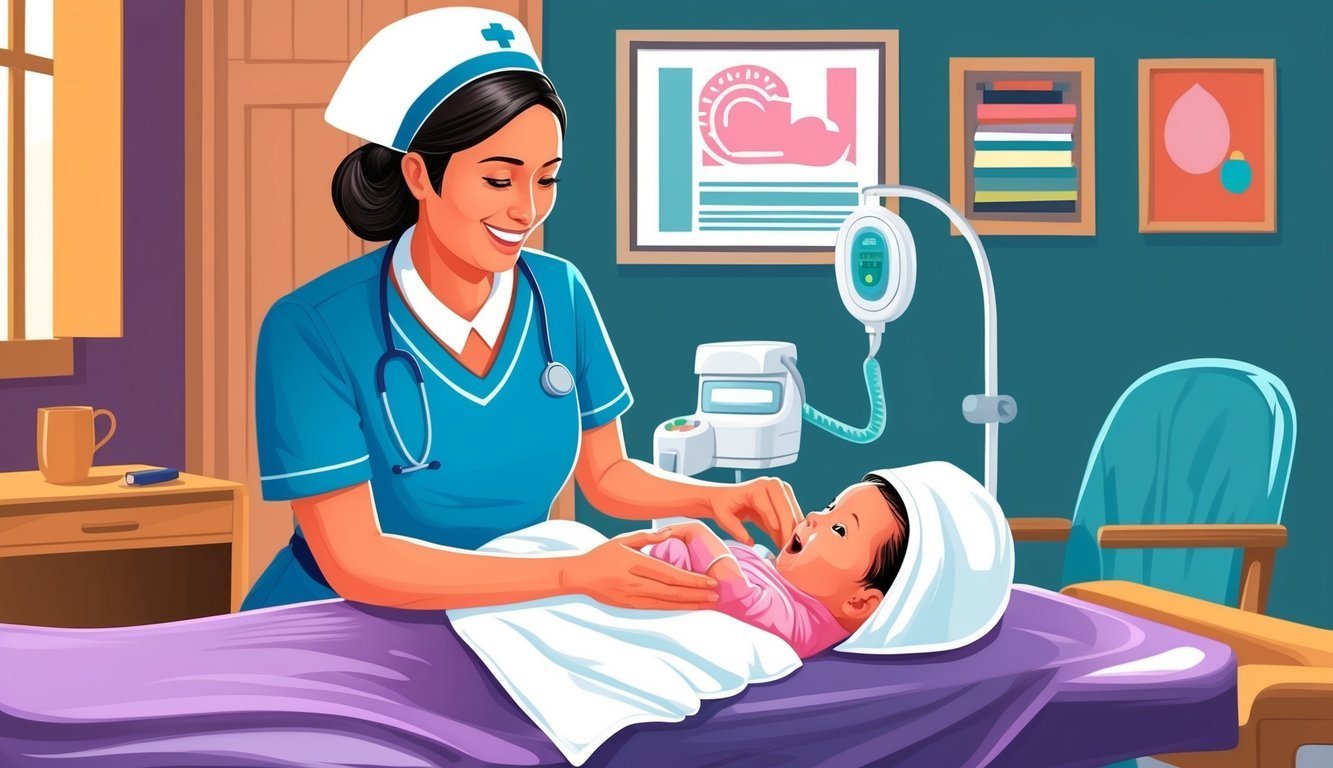As you consider your options for maternity and reproductive health care, it’s crucial to understand the role of a nurse midwife.
Nurse midwives provide comprehensive care throughout a woman’s life, focusing on pregnancy, childbirth, and reproductive health.
They are trained professionals who blend medical expertise with a holistic approach to health care, ensuring personalized support for women during these significant life events.
You may wonder how nurse midwives differ from obstetricians and what unique advantages they offer.
Unlike traditional obstetricians, nurse midwives often prioritize a more natural childbirth experience and provide continuous support during labor and delivery.
Their training includes not just the clinical components but also emphasizes the importance of emotional and psychological well-being for expectant mothers.
If you’re seeking more information about the qualifications needed to become a nurse midwife or the types of care they deliver, resources like the American College of Nurse-Midwives can offer valuable insights.
Exploring the pathways to this fulfilling career can help you appreciate the vital role nurse midwives play in women’s health.
The Fundamentals of Midwifery
Midwifery is a comprehensive field focusing on women’s health care, particularly during pregnancy, childbirth, and postpartum.
As a nurse midwife, you will engage in both clinical practices and holistic approaches to support women’s health.
History and Evolution of Midwifery
Midwifery has roots that trace back thousands of years, with evidence of midwives present in ancient civilizations such as Egypt and Greece.
Historically, these practitioners relied on traditional methods and herbal remedies to assist women during childbirth.
In the 19th and 20th centuries, midwifery began to evolve into a more structured profession.
The establishment of formal education and certification processes for nurse-midwives led to increased recognition and the integration of midwifery in modern healthcare.
Today, the role of midwives is recognized worldwide, with organizations like the American College of Nurse-Midwives advocating for midwifery care as a critical component of maternal health.
Roles and Responsibilities of Nurse Midwives
As a nurse midwife, your roles are multifaceted and vital to patient care.
You provide comprehensive midwifery care, which includes:
- Prenatal Care: Conducting regular check-ups and screenings to monitor the health of both mother and baby.
- Labor and Delivery Support: Assisting with childbirth in various settings, including homes and hospitals.
- Postpartum Visits: Offering guidance and support post-delivery to promote recovery and education on newborn care.
Additionally, you focus on holistic care, addressing physical, emotional, and social aspects of women’s health.
This may involve counseling, education on family planning, and managing reproductive health issues.
Your approach fosters an environment of trust and empowerment for patients, aligning with the core values of midwifery.
For further information on competencies, refer to the ACNM Core Competencies.
Pathways to Becoming a Nurse Midwife
Becoming a nurse midwife requires a clear educational pathway and obtaining specific certifications and licensure.
The journey begins with gaining a nursing degree, followed by additional training and certification in midwifery.
Educational Requirements
To start your career as a nurse midwife, you first need to obtain a Bachelor of Science in Nursing (BSN) or an Associate Degree in Nursing (ADN).
A BSN is preferred for advanced practice roles and opens more opportunities for higher education.
After becoming a registered nurse (RN), you can pursue further specialization.
Programs leading to a Master of Science in Nursing (MSN) with a focus on midwifery are essential.
Accreditation is important; ensure your program is recognized by the Accreditation Commission for Midwifery Education.
If you started with an ADN, consider enrolling in an RN to BSN program to bridge the gap to a BSN.
This transition facilitates a smoother shift into master’s level studies.
Necessary Certifications and Licensure
Once you have completed your educational requirements, you must earn your RN license by passing the NCLEX-RN exam.
This essential step allows you to practice as a registered nurse.
To become a licensed Certified Nurse Midwife (CNM), you will need to pass the certification exam administered by the American Midwifery Certification Board.
This certification confirms your competency in midwifery care.
Some programs may also require you to take the GRE for admission to their master’s programs.
Finally, consider pursuing a Doctor of Nursing Practice (DNP) program for further advancement, which enhances your skills and knowledge, positioning you as a leader in the field.
Clinical Skills and Services Offered
Nurse-midwives provide a broad range of clinical skills and services aimed at supporting women’s health throughout different life stages.
Their expertise includes reproductive health, prenatal care, labor and delivery, and gynecological services, offering comprehensive support and care.
Preconception and Reproductive Health Services
In this phase, nurse-midwives focus on enhancing reproductive health and preparing for a healthy pregnancy.
They provide family planning services, helping you to make informed decisions about contraception and reproductive choices.
Nurse-midwives also perform preventive health screenings to identify any underlying health issues.
These screenings can range from pelvic exams to tests for sexually transmitted infections (STIs).
Additionally, they offer counseling on lifestyle modifications, such as nutrition and exercise, which can positively impact your reproductive health.
By addressing these aspects, they lay a strong foundation for your future pregnancy.
Prenatal, Labor, and Postpartum Care
During pregnancy, nurse-midwives conduct comprehensive prenatal visits, monitoring both your physical and emotional well-being.
They track fetal development and administer necessary tests, ensuring a smooth pregnancy journey.
During labor and delivery, they provide hands-on support, guiding you through the birthing process.
With a focus on personalized care, they help you achieve your birth plan while ensuring safety for both you and your baby.
After delivery, postpartum care includes education on newborn care and postpartum recovery.
They address physical recovery and emotional support, recognizing the importance of mental health during this transition.
Women’s Health and Gynecological Services
Nurse-midwives offer comprehensive gynecological care throughout your life.
They perform regular examinations, including Pap smears and breast exams, essential for early detection of potential issues.
In addition, they are trained to diagnose and manage common gynecological disorders, such as irregular cycles or endometriosis.
This enables you to receive timely treatment and education about your health.
For ongoing care, they also provide menopausal support, helping you navigate symptoms and making lifestyle recommendations.
These services ensure that you maintain your overall health as you age.
Professional Practice and Employment

Nurse-midwives play a critical role in providing reproductive and holistic care to women and families.
Their practice encompasses various settings, responsibilities, and opportunities for growth as advanced practice registered nurses (APRNs).
Practical Settings for Nurse Midwives
You will find certified nurse-midwives (CNMs) working in diverse environments, including clinics, hospitals, private practices, and birthing centers.
Each setting offers unique advantages:
| Setting | Description |
|---|---|
| Clinics | Often focus on outpatient care, including prenatal visits and family planning. |
| Hospitals | Provide more comprehensive care, including labor and delivery services. |
| Private Practices | Allow for a personalized approach to midwifery, with a focus on developing lasting relationships with patients. |
| Birthing Centers | Offer a homelike environment for low-risk births, emphasizing natural childbirth practices. |
This variety ensures that you can find a practice setting that aligns with your professional goals and values.
Scope of Practice and Regulatory Framework
The scope of practice for nurse midwives is defined by state licensure laws and regulations.
Typically, CNMs are authorized to provide care throughout pregnancy, labor, birth, postpartum, and newborn care.
They also offer gynecological services and family planning.
The American College of Nurse-Midwives (ACNM) outlines essential competencies and standards that CNMs should uphold.
It’s vital to stay informed about state-specific regulations, as they can influence your practice, including:
- Prescriptive authority
- Collaborative agreements with physicians
- Insurance reimbursement policies
Understanding these parameters helps you navigate your professional responsibilities effectively.
Advancement Opportunities and Continuing Education
Continuing education and professional development are essential in nurse-midwifery.
You may pursue advanced certifications through organizations like the ACNM, enhancing your expertise and job prospects.
Opportunities for advancement include roles in education, leadership, and research.
Your career can expand into:
- Clinical leadership positions
- Teaching roles in nurse-midwifery programs
- Policy-making and advocacy
Engaging in ongoing education will keep you current on best practices and emerging trends in midwifery.
This commitment not only bolsters your career but also ensures your patients receive the best possible care.
Staying linked to professional organizations can provide resources for valuable workshops and networking opportunities.
The Impact of Nurse Midwives on Patient Care
Nurse midwives play a crucial role in enhancing patient care through specialized support and education.
They focus on maternal and newborn outcomes while advocating for informed choices throughout the pregnancy and postpartum periods.
Improving Maternal and Newborn Outcomes
Certified nurse-midwives (CNMs) significantly contribute to improved maternal and newborn outcomes.
Their holistic approach encompasses prenatal care, labor management, and postnatal support.
Research shows that midwifery care is associated with lower rates of cesarean deliveries and fewer preterm births.
These results stem from personalized care models that prioritize patient preferences and utilize evidence-based practices.
For instance, CNMs emphasize pain management options, such as breathing techniques and hydrotherapy, fostering a more comfortable birth experience.
Additionally, midwives support home births, when safe and chosen by the family, bridging care between home and health systems.
Educational Roles and Patient Advocacy
Nurse midwives also play a pivotal role in patient education and advocacy.
They provide comprehensive health education, ensuring you understand your pregnancy journey.
This includes prenatal education about nutrition, exercise, and breastfeeding.
These empower you with the knowledge needed for healthier choices.
Furthermore, midwives advocate for your preferences in care, guiding decisions that align with your values.
They also facilitate open discussions about options such as pain relief, labor positions, and postpartum care.
Their commitment to informed decision-making enables you to engage actively in your care.
If you’re seeking resources for further information, consider exploring ACNM, which offers valuable insights into midwifery practice and education.

